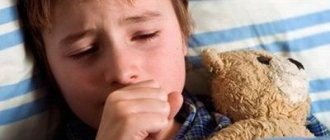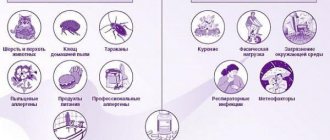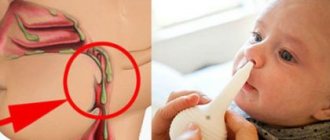Active coughing attacks can torment a baby in the dark, preventing both him and his parents from sleeping. When he coughs strainedly, you need to help him quickly. A dry cough in a child at night means that the body is protecting itself from pathological microorganisms, viruses and foreign mucus in an enhanced manner.
The evening attack periodically worsens so much that it prevents sleep. However, a strong cough only helps to clear the child's throat, trachea and bronchi. The task of parents at this stage is to understand the cause of the disease and smooth out its symptoms.
Causes of cough at night in children
There are conditions that cause a dry cough at night:
- ARVI, cold results.
- Allergic processes. They cause a sudden cough; the allergen can be household chemicals or flowers.
- Bronchial asthma. Usually torments the child in the second half of the night.
- Rhinitis, sinusitis, runny nose.
- Chronic pharyngitis. It is expressed by a dry cough and sore throat.
- Teething. Promotes mild night coughing.
- Dry air causes irritation of the respiratory tract.
- Helminthiasis. Some types of helminths migrate through the lungs.
Whooping cough is also characterized by similar symptoms. This is a type of bacterial respiratory infection that is accompanied by a buzzing “whooping cough” and characteristic watery eyes.
Dry cough throughout the night
The attack intensifies due to certain processes. The cause is daily fluctuations in the nervous and endocrine systems. In the evening, the activity of the vagus nerve and nervous system is increased, the bronchi become narrowed and the release of sputum becomes difficult. In a horizontal position, it is more difficult for the body to supply blood to the bronchi. If a child gets sick with rhinitis, which is not accompanied by an accumulation of sputum, when lying down, mucus suddenly flows from the nasal passages into the nasopharynx area. This causes reflex cough impulses of an intensified nature.
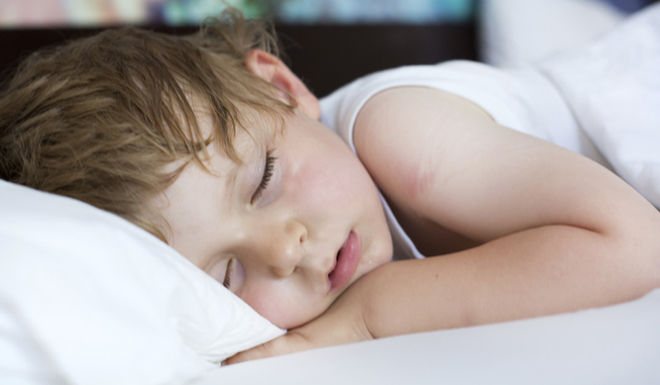
There are the following characteristics of dry cough in children:
- Suffocating.
- Gorlova.
- Barking.
- Whistling.
The attack is also assessed by duration and duration. There are acute, subacute and chronic forms.
Severe cough with attacks to the point of vomiting
When a child's throat, face, and neck muscles are very tense, the excessive pressure in the throat may trigger the gag reflex. Vomiting is not severe, but can recur during a prolonged attack. The reasons for this condition are:
- Post-acute respiratory viral infections and their complications.
- Tracheitis, tracheobronchitis.
- Whooping cough.
- Bronchial asthma.
- Allergic reaction.
Gastroesophageal reflux disease occurs when contents from the gastric environment enter the esophagus. The juice irritates the walls of the throat, causing a dry cough, excessive salivation, and sometimes vomiting.
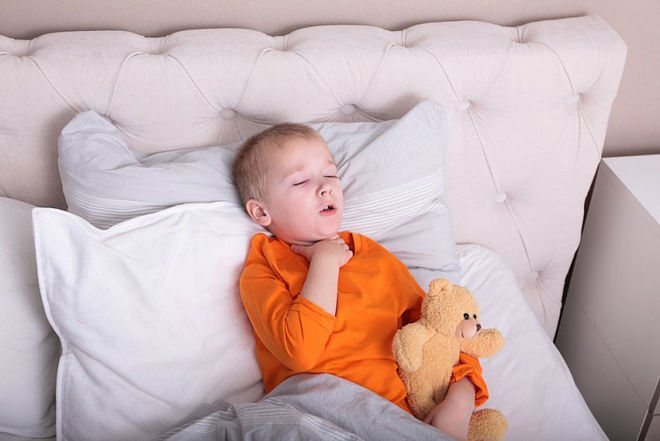
A dry cough is suffocating, very exhausting for the baby and takes a lot of energy from him. The urge to vomit occurs immediately at the moment of coughing. Often children are afraid of the next cough shocks, lest they vomit again.
The very phenomenon of vomiting when coughing is not dangerous, unlike vomiting during an infectious process or poisoning. However, such urges signal that the child’s condition requires immediate adult intervention.
Cough that gets worse in the morning
A persistent dry cough at normal temperature may indicate bronchial asthma. This is an allergic phenomenon of a chronic nature, which develops when the lumen of the lower respiratory tract narrows. Bronchial asthma has become increasingly diagnosed in young children. Cough attacks occur more often in the morning, as well as during and after physical activity. The pathology is characterized by a wheezing cough with shortness of breath, varying in intensity and duration.
Parents often note that after suffering from acute respiratory viral infection and the disappearance of all symptoms of the disease, after 2-3 days, coughing attacks resume and torment the child at 4-5 in the morning. Pediatricians say that due to the disease, the immune system is weakened and irritation of the mucous membranes remains. This is why “cough” relapses occur as a residual phenomenon.
Adenoiditis is another common disease characterized by a coughing attack. Adenoids in children occur as a complication after suffering from sinusitis, pharyngitis, tonsillitis and other diseases. The clinical sign of adenoiditis is a cough attack, which appears against the background of irritation of the nasopharynx with mucus or pus. Pathological cough is a reflex reaction to impaired nasal breathing. It is constant in nature, disturbing at night, closer to the morning. Often, adenoids require removal so that the child stops suffering and can sleep normally.
Cough without fever
The absence of hyperthermia in the presence of a cough indicates a viral process in the child’s body. The disease begins with a slight sore throat, is accompanied by mild irritation and can gradually develop into an obsessive coughing attack. If the cause of the illness is a strain of influenza, the child will feel much weaker. Influenza often passes without fever and is characterized by a dry and hoarse cough, which becomes productive and completely disappears only 8-12 days after applying the correct therapy.
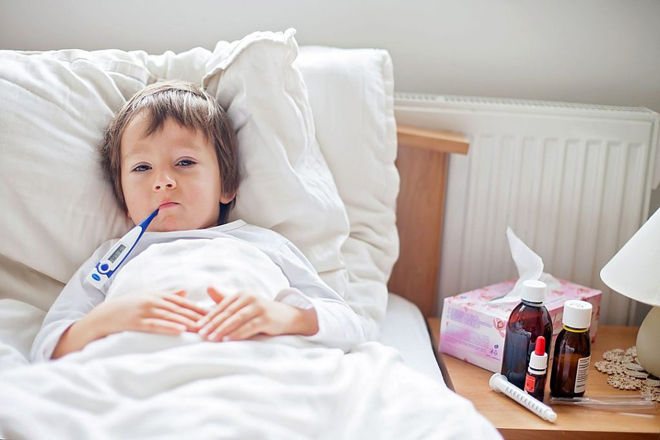
Against the background of environmental irritants, an allergic reaction may occur that is not accompanied by fever. The allergens are:
- House dust.
- Bird fluff.
- Animal epithelial cells.
- Dust mites.
- Cockroaches.
- Chemicals.
- Pollen.
- Perfumery.
Frequent interaction with allergic pathogens will cause a chronic cough attack that cannot be treated with antitussive drugs. The only symptomatic signs of an allergy are a cough, runny nose, redness and watery eyes.
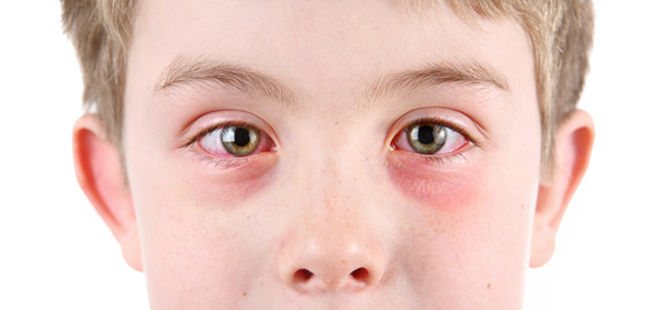
Dry air also causes sharp, spasmodic exhalations. Low indoor humidity leads to a dry cough. The baby's mucous membrane is not sufficiently moisturized. Small allergens do not have the opportunity to settle on the floor. Dust, hair, and small particles regularly enter the respiratory tract and cause irritation. Summer heat also dries out the mucous membranes. At this time, the respiratory system literally works to its limits. The baby's immunity decreases, spasmodic breathing follows a dry throat.
A dry cough attack is sometimes caused by helminths. A number of worms provoke coughing due to their accumulation in the lung tissues. Typically, helminths live in the intestines, gradually seeping into the vascular system. They travel through the bloodstream to other organs. Penetration of larvae into the upper respiratory tract (lungs, bronchi, trachea) causes dysfunction.
Night cough does not allow you to sleep. How to stop an attack?
Cough is an important assistant in the fight against disease. This is a protective reflex that helps clear the airways of mucus and germs. But nightly coughing attacks interfere with rest and exhaust an already weakened body.
Why does my cough get worse at night?
When a person is in a horizontal position, mucus accumulates in the nasopharynx and the airways are not cleared. When you have a runny nose, discharge from the nose and paranasal sinuses flows into the throat and causes a cough reflex, so the cough is painful during sleep, especially when we roll over from side to side, and in the morning when we get out of bed.
Dust and dry air can worsen a cough. This is especially true in apartments with central heating. Dry and hot air irritates the mucous membranes and provokes coughing attacks.
To alleviate your condition, regularly ventilate the bedroom and do wet cleaning. It would be a good idea to buy an air humidifier.
But if you don’t have one, and you need to fight a cough right now, you can hang a damp towel on the radiator or place a container of water next to the bed.
Dry and wet cough - is there a difference?
Eat. The wet cough associated with colds and flu is useful for clearing the nasopharynx and airways. Phlegm protects the mucous membranes and prevents bacteria from entering the body.
A dry, scratchy cough, on the contrary, is quite dangerous for the body. With such a cough, sputum is not released, the bronchi are not cleared, and the nasopharynx dries out. A constant inflammatory process is maintained on the walls of the respiratory tract.
A dry cough, unlike a wet one, does not help you recover, but only exhausts you and prevents you from resting. To speed up the healing process, you need to try to convert a dry cough into a wet one. But this should be done under the supervision of a doctor.
Is a child’s night cough dangerous?
No, unless the cough is a symptom of a serious illness (such as asthma or pneumonia). The most common cause of cough in children is a viral infection.
Viruses infect the respiratory tract at different levels - from the nose to the bronchi, bronchioles and lungs. Sometimes the cough continues for several weeks because the child does not have time to recover from one infection and catches another.
About 10% of children continue to cough even after ARVI has been treated.
Some doctors even propose to introduce a new term - “post-viral cough”. Such long attacks frighten parents, but most often they do not indicate serious pathologies.
But even if the illness is not dangerous or has completely disappeared, it is difficult for the child to endure sleepless nights, especially with a dry cough. And parents have a hard time if they don’t know how to help.
Important: if a child often coughs at night, this may be a sign of respiratory tract pathology, allergies or whooping cough. Be sure to consult a doctor and do not treat your child yourself, so as not to worsen his condition.
What to do if a child coughs and cannot sleep?
To quickly stop an attack of night cough and help your child, you can:
- Place a high pillow under the back and turn the child from back to side to prevent a strong outflow of mucus swallowed and accumulated during the day.
- If the child does not have allergies, a spoonful of honey will help - it envelops and soothes the mucous membranes of the throat.
- To soften the cough and calm the airways, give your child warm tea or water to drink. It is better not to drink carbonated drinks or citrus juices - they can further irritate already inflamed mucous membranes.
How to stop a night cough in an adult?
Try to find a comfortable position. Place a high pillow under your back. Drink warm tea or water to soothe your throat. This is especially important for dry coughs - the liquid will help soothe the irritation.
If you have trouble breathing, ventilate your bedroom and try humidifying the air. If you don't have a humidifier, hang a couple of wet towels over the radiator. You can arrange a short steam therapy session: go into the bathroom, close the door, turn on the hot water and wait a few minutes.
What medications will help get rid of a cough?
Treating a cough only with folk remedies is ineffective and dangerous. If it does not go away within a few days and nights, be sure to consult a doctor. It is important to remember that cough is a symptom of a disease, and not an independent disease, and therefore complex treatment is required.
A wet cough is treated with mucolytic and expectorant drugs. They improve the removal of phlegm and mucus. But with a dry cough, such medications do not help, but only intensify the attacks, because the body will try to remove phlegm that is not there. Antitussive drugs that inhibit or suppress the cough reflex help get rid of a dry cough.
Mucolytic drugs, which include, for example, ambroxol, will help cope with a wet cough due to bronchitis or pneumonia.
The SANTO company produces Ambro® solution, which can be taken orally or inhaled.
Ambro® has an anti-inflammatory effect, as well as antioxidant properties, stimulates local immunity, increases the concentration of antibiotics in sputum and bronchial secretions.
in the text, select it with the mouse and press Ctrl+Enter
Source: https://informburo.kz/cards/nochnoy-kashel-ne-dayot-spat-kak-ostanovit-pristup.html
How to stop a child's night cough?
Sometimes during the day the cough reflex is absent, while in the evening it cannot be stopped. In such a situation, you need to help the baby and calm him down. If a child has attacks of dry cough at night, you need to move the baby to an upright position, sitting him in the crib. Warm milk, mineral water with soda, and chamomile decoction will quickly soften the mucous membrane of the throat and relieve soreness. A spoon of honey and a piece of butter, which you need to slowly dissolve, will also help to overcome the problem. To treat prolonged cough attacks, medications, folk remedies, and inhalations are used.

Why coughing attacks occur when lying down and how to get rid of them
Patients suffering from cough while lying down are forced to forget about normal sleep and rest. It is exhausting and deteriorates physical and mental health. A cough reflex that occurs when lying on your back can be a sign of a serious pathology and requires qualified diagnosis and immediate treatment. Timely consultation with a doctor will improve the prognosis of the disease.
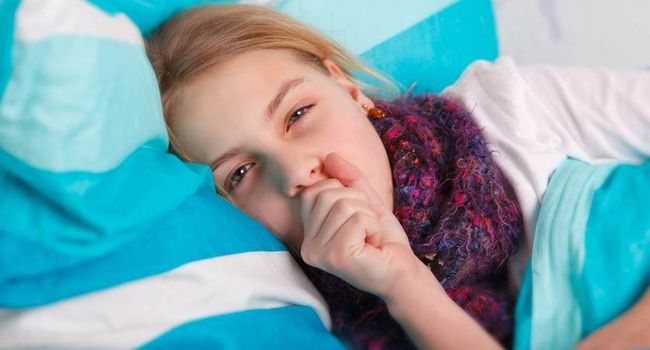
Medicines
Drug treatment in children is carried out based on the child’s age, etiology of the disease and its course. Medicines for the treatment of dry cough differ in composition, mechanism of action and release form. There are herbal, synthetic and combined. For painful coughs, experts most often prescribe antitussive drugs of central and peripheral action. The first act directly on the cough center located in the brain, stopping cough impulses. Peripheral agents suppress the cough reflex and have an anti-inflammatory effect without affecting the respiratory center.
Herbal medicines are better tolerated by children, thin mucus and speed up its discharge.
For therapeutic purposes, systemic drugs can also be prescribed - antibiotics, antivirals, antihistamines. Such remedies do not stop coughing, but they can cure the cause of the disease. The following tools are actively used in medical practice:
Table of cough suppressants for children
| Drug name | Active substance | Features of the drug |
| Gedelix | Ivy extract | Herbal preparation for persistent cough prescribed from birth |
| Fluditek | Carbocisteine | Prescribed to children from birth |
| Ambroxol | Ambroxol | A mucolytic agent that thins mucus in the lungs. Prescribed from 1–1.5 months |
| overslept | Ivy extract | Treats both dry and wet cough. Well tolerated and can be given to infants from birth |
| Sinekod | Butamirate citrate | Central acting drug. Available in different forms. Drops are indicated for children from 2–3 months |
| Linkas | Adhatoda vasika | Designed for babies from 6 months |
| Gerbion | Plantain, primrose and ivy extract | Relieves cough, eliminates irritation of the respiratory tract. Applicable from 6 months |
| Stoptussin | Butamirate dihydrogen citrate and guaifenesin | In the form of drops it is prescribed from 6 months. The medication taken depends on the child's weight |
| Libexin | Prenoxdiazine | A peripheral action agent that reduces the sensitivity of nerve endings and relaxes the bronchial muscles. Indicated for children from the first year of life |
| Mukaltin | Marshmallow extract | Prescribed for children over one year of age |
| Bronholitin | Glaucine hydrobromide, ephedrine hydrochloride | Combined drug. It has antispasmodic and bronchodilator properties. Eliminates dry cough. Designed for children from 3 years old |
| Glauvent | Glaucine hydrobromide | Appointed from 4 years of age |
| Erespal | Fenspiride hydrochloride | Combined syrup with expectorant properties. Helps with allergic and bacterial coughs. Used from 5 years |
In the absence of elevated temperature, specialists prescribe warming ointments to ease the attack. The means of such action are Doctor Mom, Badger, Pulmex, Eucabal. Pediatricians recommend using ointments for children over 2 years of age.
Expert opinion
Safronova Marina Arkadyevna
Pediatrician of the highest category
If a child's dry cough is caused by allergies, whooping cough or false croup, in these cases the use of warming ointments can aggravate the baby's condition. For example, the strong-smelling and allergenic components of Doctor Mom especially often contribute to an allergic reaction.
Cough while lying down: causes and treatment
Coughing while lying down is not always a manifestation of colds in adults and children. It can occur naturally, that is, physiologically, but this option is quite rare. The reason for a physiological cough is to clear the upper respiratory tract of dust particles or foreign protein molecules, which are irritants for the mucous membrane. This cough most often occurs while lying down. But if such a symptom develops due to any diseases, then most likely this is its first manifestation.
It happens that the cough while lying down gets a little worse. It is necessary to understand the mechanisms of development of such conditions and how to deal with it. After all, a cough while lying down is the most uncomfortable and severe among all others. It doesn’t allow you to get a full night’s sleep, rest, and can greatly disturb those around you.
Night attacks
The worsening intensity of cough in a horizontal position is due to the fact that the patient is simply not able to cough deeply, that is, the force of exhalation is insufficient. Also, metabolism at night is not so active, which is due to the characteristics of the nervous system. Blood circulation is somewhat slow, which prevents the productive breakdown of the resulting mucus and sputum, which irritates the mucous membrane of the respiratory tract; as a result, the symptoms worsen in both an adult and a child.
It should be taken into account that any severe cough, especially one that begins at night, most likely indicates some kind of cold. Both dry and wet cough can develop.
Most often, coughing at night indicates an inflammatory process in the bronchi, which is provoked by the presence of viruses, allergens or harmful microorganisms. But there are other pathologies of the respiratory system that have such clinical manifestations.
Causes of cough during sleep
The most common factors that provoke a cough that begins at night can be:
- Physiological, for example, in a lying position due to poor outflow and breakdown of mucus and sputum;
- Physical, such as dry, damp, cold air in the bedroom. It may also irritate the mucous membranes of the respiratory tract;
- Biological – the presence of viruses, foreign proteins – allergens. In addition to normal irritation, even bronchospasm may develop. This symptom is characteristic of bronchial asthma;
- Pathologies and diseases. These include inflammatory processes (bronchitis, chronic obstructive pulmonary disease) or congenital malformations (pulmonary cystic fibrosis).
Cough during sleep in adults
Most often, coughing attacks at night develop due to exacerbation of bronchial asthma or decompensated heart failure. Another cause may be gastroesophageal reflux disease, when digested food with gastric juice passes from the stomach into the esophagus and can also irritate the respiratory tract, thereby provoking an attack in a horizontal position.
With bronchial asthma, wheezing appears, which can be heard at a distance, respiratory and cardiac failure develops, which is why tachypnea and tachycardia appear.
When the cause lies in a gastroenterological diagnosis, cardiopulmonary manifestations are not so obvious, and severe heartburn also appears.
Cough during sleep in children
A child's cough at night is most often caused by an infection. Other common causes include asthma, allergies or the presence of a foreign body.
Allergens in a child can be animal hair, household chemicals, tobacco smoke, house dust or pollen. If a child has a weakened immune system and often takes antibacterial drugs, he may develop a cough due to a fungal infection or develop an allergy to antibiotics. Sinusitis and rhinitis also quite often provoke such symptoms.
Fighting cough
To understand how to deal with a cough, you must be able to apply the basic principles of physical therapy. They help you forget about the phrase “the cough is worse when I lie down”:
- One of the most effective methods to combat such unpleasant symptoms is warm drinks - tea, herbs, milk and honey. They soften the dryness of cough and have a beneficial effect on the mucous membrane;
- A humidifier helps reduce the irritating effects of dry air. A makeshift or simplified version of a humidifier can be drying clothes at night in the sleeping room;
- If coughing is unproductive and does not cause attacks of suffocation, then you can use drugs that suppress the cough center - Stoptussin or valerian;
- Antihistamines will help fight allergic cough;
- Steam inhalations moisten the air and soften dry cough.
Antitussive drugs are strictly prohibited for children under one year of age, since the nervous system is not yet fully formed. It should also be remembered that chest rubbing and inhalation are prohibited for up to six months, and antiallergic drugs must be titrated correctly. To combat the accumulation of sputum, you need to frequently change the position of the child's body.
The need to use mustard plasters has not been proven by doctors, so you should think carefully before covering your baby with them. Remember that they are strictly contraindicated in case of hyperthermia or various skin irritations.
Antitussive diet
There are some recommendations regarding diet, which also reduces cough symptoms. Your diet should include foods such as mashed potatoes and fruit juices with honey. It would not be amiss to use fruits and vegetables that have a high content of vitamin C. These products include cranberries, persimmons, and citrus fruits. It is possible to include rolled oats with vegetable oil, as well as radishes, in the diet.
It is important to know!
Shocking statistics! It has been established that almost 50% (!) of problems with the respiratory tract, as well as chills, Fever and temperature are caused by infection with various types of parasites (Ascaris, Giardia, Toxocara). Worms cause enormous harm to the human body, and our immune system is the first to suffer, which, in turn, must protect the body from various diseases. People taught by bitter experience to get rid of all types of parasites use...
Read more.. "
If these manipulations and diet do not relieve symptoms, you should visit a doctor to undergo a full examination and prescribe treatment.
stoporvi.ru
Inhalations
The procedures allow you to quickly liquefy mucus and reduce spasms of the respiratory tract. Inhalations have a direct effect on the muscles and mucous membranes of organs. They are prescribed from a very early age and are indicated for the following diseases:
- Sinusitis and tonsillitis.
- Bronchial asthma.
- Tracheitis, laryngitis, pharyngitis of viral and bacterial etiology.
- Bronchitis, pneumonia.
- Cystic fibrosis.
Inhalation procedures are also an excellent preventive measure that helps prevent exacerbations of chronic bronchitis and avoid congestion. Steam techniques and nebulizers are widely used in home practice. The latter are a more effective option; they allow you to overcome the disease at an early stage of its manifestation; they are available in almost every medical institution. Their use is allowed even for children under 1 year of age.
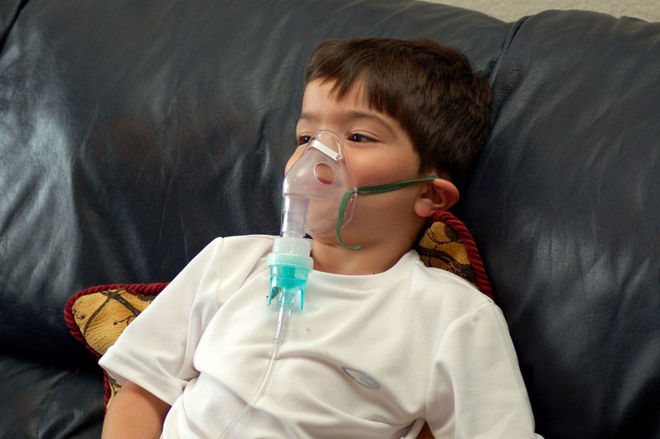
The nebulizer allows you to accurately dose the drug and control the temperature. It eliminates the possibility of burns to the upper respiratory tract. The mechanism of action is the breakdown of the drug into tiny particles and their penetration deep into the respiratory tract. This ensures the possibility of acting directly on the area of inflammation. The product is diluted with saline solution in a special glass. For one procedure you will need no more than 4 ml of the finished drug.
It is worth considering that 1 ml of saline solution is consumed by the nebulizer itself for operation.
The medicine is split into small particles of different diameters, ensuring penetration to a certain level of the respiratory tract. Elements measuring 2-4 microns can penetrate directly into the alveoli. For children, the use of masks that fit closely to the face is recommended. For older children, there is a special tube-mouthpiece that is wrapped around the lips. For inhalation for dry cough, children are prescribed the following medications:
- Berodual;
- Berotek;
- Ambrobene;
- Lazolvan;
- Trovent;
- Ambroxol.
If your body temperature is above 37.5 °C, steam inhalation is prohibited.
When working with a nebulizer, you need to remember that all procedures are carried out half an hour after eating. Food intake is carried out no earlier than an hour after inhalation. The maximum duration of the therapeutic course is 12 days. Inhalations can be performed every four hours.
Causes of cough in healthy people when lying down
Many people wonder why they have a strong cough when they go to bed. This is a physiological reflex that occurs due to contraction of the muscles of the respiratory tract due to irritation of the receptors.
Cough while lying down becomes more severe as a result of slowing blood flow in the organs of the respiratory system and disruption of the drainage function of the bronchi and lungs. Sputum gradually accumulates, which leads to a cough of varying intensity.
A healthy person may cough for the following reasons:
- The body reacts to smog and dust. This problem arises among those who live in a metropolis, workers at chemical plants, and people who spend a long time in dusty rooms.
- Tobacco is a serious irritant. The respiratory tract suffers due to constant exposure to toxic hot smoke. Smokers have difficulty breathing when lying on their back, a sore throat, and a severe cough with sputum discharge.
- Asthmatics cough constantly when lying down. They are tormented by a strong dry cough, which is accompanied by pain in the chest, wheezing in the bronchi, and difficulty breathing.
- Eating a large amount of food before bed sometimes provokes reflux disease, when the contents of the stomach are thrown into the esophagus. Symptoms intensify after taking a horizontal position. At the same time, a feeling of bitterness in the mouth and heartburn appears.
- An allergic reaction can also cause coughing while lying on the right/left side and back. Allergies can occur to the filling of pillows and blankets, to dust mites or washing powder. In this case, the cough is dry, without fever, sometimes accompanied by a runny nose, skin rash, and sore throat.
- Intense dry cough attacks without sputum production begin due to low humidity in the room and insufficient ventilation.
- Painful attacks when a person lies down are intensified due to heart failure, as a result of congestion in the respiratory organs. In this case, the cough is dry, and in rare cases, clear sputum is produced. If a baby coughs for a long time and only during sleep, this sometimes indicates a congenital heart defect.
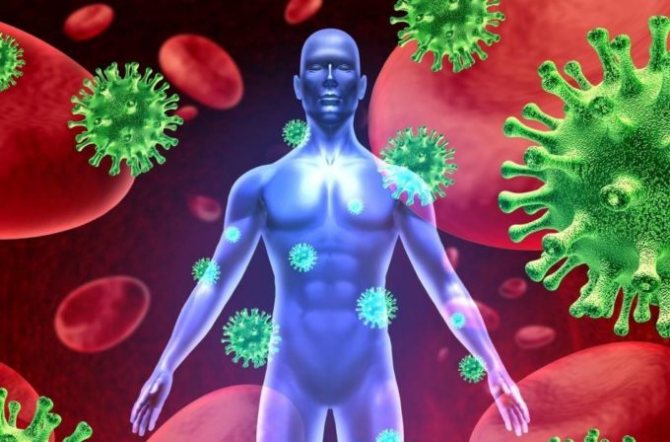
Seizures in a healthy person may occur due to weakened immunity. This is often due to an incorrect lifestyle.
Folk remedies
There are ways that can help a child with a dry cough at night at home. Proven folk remedies will eliminate the cough reflex. Before starting therapy, you need to find out what type of pathogen caused the disease. Often the symptom appears during ARVI. In this case, bed rest and drinking plenty of fluids are sufficient. Parents should respond carefully to changes in the child's condition.
To calm a cough, babies under one year of age are advised to drink a warm drink - this can be milk, water, compote, linden tea, chamomile decoction. If the child is not prone to allergies, you can add ¼ teaspoon of honey to the drink. A piece of butter with milk will also effectively relieve a cough attack before bed.
Komarovsky about night cough
Many doctor's videos talk about how to properly deal with a child's coughing attack. Evgeniy Olegovich claims that cough is an important component of the immune system. This is an effective way to cleanse the respiratory tract, which allows you to get rid of excessively accumulated mucus in the bronchi. The main thing when coughing is to prevent the mucus from drying out. According to the doctor, a dry cough needs cool, moist air and plenty of fluids.
There is actually no need for mucolytics until the age of two. The doctor suggests giving up expectorant medications altogether. Drinking warm liquid, rinsing your nose and constantly humidifying the air will achieve the same effect without any risk. In order to moisten a dry cough, you need to bathe your baby often - moist air thins the mucus and helps to cough.
The most common cause of a nighttime dry cough in a child is a runny nose. It is enough to place the pillow higher, and the problem will be solved - the baby will be able to sleep. It is also permissible to use vasoconstrictor drops, but only as a last resort. It is important to monitor the quality of the baby’s linen and remove dust sources, especially during illness. The doctor insists that daytime walks should not fall out of the child’s schedule. Fresh air is one of the most effective methods of treatment. However, if your body temperature is elevated, or the weather outside is “non-flying”, you should definitely stay at home.
Tips for moms
When a child has a dry cough, it is important to create the right environmental conditions to stop it. The speed of health recovery depends on this. Humidity levels should be maintained between 50-70%. A humidifier will help adjust this indicator. If it is not available, you can hang wet cloths over the radiators and frequently wipe the floors. The air temperature in the room should not exceed 19 degrees. The room must be constantly ventilated. You need to know that the critical period from the start of therapy is considered to be 2 weeks. If during this time you have not been able to cope with the cough on your own, it does not stop and there is a dynamics of deterioration, you should immediately consult a doctor.
Author of the article
Pediatrician.
Diagnosis and treatment of ENT diseases in children.
24 years of experience.
Source
An unexpected strong cough in a child at night is a cause for justified concern for parents. The main cause of concern is those cases when the baby behaves normally during the day, looks healthy, but sleeps poorly and coughs at night. We urgently need to take action. First of all, when a child coughs in his sleep, you will need to consult a doctor to determine the cause of the disturbance. Coughing in children in a dream indicates the body’s fight against infection or inflammation. Coughing at night is not a cause, but a consequence of a lesion.
Why does your cough get worse at night or before bed?
Coughing when falling asleep often occurs due to the horizontal position in which the person is. Blood circulation in the nasopharynx slows down, swelling of the mucous membrane appears, and its secretion flows into the throat.

A cough that interferes with sleep, in this case, is spontaneous and unproductive.
If a cough begins before bedtime, it is provoked by the following factors:
- Nasal secretions accumulate in the trachea, as well as the lungs, which causes bouts of coughing with phlegm.
- Bronchial asthma. Severe attacks occur due to mucus blocking the airways. They bother you throughout the day, but become worse after the person goes to bed. Accompanied by discomfort in the sternum.
- Contaminated air. People who live in large cities or work with hazardous substances may cough before going to bed.
- Recovery period after treatment of respiratory diseases. During the month, sputum may still be produced from time to time.
- Pneumonia. It can occur without fever. Accompanied by a prolonged, suffocating cough before bedtime, heaviness, and aching in the chest.
- Whooping cough. It is characterized by an intense cough with spasms of the larynx and abdominal cavity. Often causes vomiting, especially after a person goes to bed.
- Bad habits. People who smoke regularly cough at night.
- Allergy. The attack may be aggravated by inhaling the smell of the powder, contact with synthetic or feather fillings, or animal hair. Accompanied by itchy skin, rashes, red eyes.
- Low or, conversely, high indoor air temperature.
- Inflammation of the adenoids in a child. Due to difficulty in nasal breathing, the baby breathes through his mouth. As a result, the mucous membrane becomes very dry and the throat begins to sore, which causes a dry cough that interferes with sleep.
- Dry air in the apartment, especially in winter, when central heating or other heating devices are turned on.
- Gastroesophageal reflux. A severe wet cough that interferes with sleep, which is accompanied by an unpleasant taste in the mouth, may be a sign of reflux of stomach contents into the esophagus and respiratory tract.
- Helminths. Parasites destroy tissue and cause disturbances in the functioning of receptors. The cough may last for a long time and then suddenly disappear.
Also, attacks often occur with heart failure. They are accompanied by a sore throat, shortness of breath, and increased heart rate.
Etiology of nocturnal attacks in children
80% of cases develop due to penetration of the virus into the body or complications as a result of its activity. The remaining 20% include gastrointestinal pathologies, allergies, etc. This small part of the reasons should also be taken into account during diagnosis.
Eruption of baby teeth
In such a situation, the child coughs in his sleep due to pain that develops in the gums. At the same time, it becomes difficult for the baby to swallow saliva and coughing occurs. In this situation, parents should put the child to sleep on his side, placing a small pillow under his head so that he cannot choke on saliva.
Viral pathologies of respiratory diseases
When a child's cough during sleep is caused by the development of ARVI, his attacks at night can be explained by the accumulation of mucus in the lungs. When inhaling, the lungs contract and the baby coughs. Also, when you have a cold, your nose is often stuffy and you can only breathe in and out through your mouth - this further increases coughing at night. A cough with sputum becomes a reason to suspect the development of a viral infection. But it can also be triggered by sinusitis, pharyngitis or rhinitis. Another reason is the onset of asthma. At the very beginning of its development, the disease manifests itself only in nocturnal attacks under the influence of spasms in the lungs. Also, when inhaling through the mouth, a characteristic whistle appears. In asthma, a dry cough develops at night due to the fact that the lungs are at rest and respond more quickly to external and internal irritants. Coughing at night causes the onset of whooping cough. Vaccination against this disease is routine in children at an early age. In this regard, a child’s cough during sleep can be caused by vaccination, but it goes away safely after a few days and should not be a cause for concern.
Causes of cough while lying down
It worsens when we take a horizontal position. This happens because the mucus that is in the nasopharynx cannot be absorbed as freely as in a standing position.
. It begins to accumulate and clog the nasopharynx, resulting in a reflex cough. The same thing happens in the lungs: the sputum of a person in a lying position is not able to quickly and effectively resolve, since in this position the blood supply to the lungs slows down.
Causes of coughing while lying down: at night the air becomes drier and colder and begins to irritate the mucous membrane of the larynx, which also provokes an attack. It is harder to cough while lying down, so you have to cough more and more intensely.
How to calm a bad cough at night
At night, if a child has a cough during sleep, then for an unknown reason, it is not recommended to give any medications, so as not to mistakenly harm the body that is not fully formed. If you know the causes and establish the allergy, you can give antihistamines - Fenistil, Zyrtec. Up to 6 months, these drugs are prohibited, and the attack can be stopped with warm drinks. To facilitate coughing at night with ARVI or other diseases of the lower respiratory tract, it is recommended to give plenty of fluids and use the following methods: A lot of water helps soothe irritated mucous membranes, thins mucus and makes coughing less debilitating.
- Milk and soda help well during an attack. But this remedy can only be used in children over 5 years of age. 100 ml of warm milk should be mixed with a quarter of a teaspoon of soda.
- Cough with rhinitis or sinusitis is well relieved by rinsing the nose with saline solution. Children also have their noses cleaned using aspirators; this should be done carefully so as not to further injure the nasal mucosa.
- Place a pillow under your head to make breathing easier, and to increase the concentration of oxygen in the air, you need to ventilate the room.
These methods will help you feel better and sleep well until the morning. Some parents, without a doctor’s testimony, are at a loss and do not understand how to carry out treatment or at least alleviate the condition. So, you should call an ambulance during a coughing attack if it is accompanied by the following signs:
- strong increase in temperature;
- whistling when coughing;
- coughing up blood;
- cough with vomiting;
- complaints of severe pain;
- appearance of rashes.
If there are no symptoms listed above, then you can use the tips described above and wait until the morning. The famous pediatrician Komarovsky says that cough is the body’s defense, so it is necessary to establish its cause and treat it first. But at the same time, do not forget to relieve coughing, which causes severe discomfort. This is very easy to do by drinking plenty of fluids and frequently airing the rooms.
How to treat a cough that occurs while lying down
The choice of treatment options depends on the cause. You need to immediately find out why a person coughs while lying on his back, what additional symptoms are present and the general condition of the patient. The treatment is complex and prescribed by a doctor.
Medicines are prescribed depending on the reason why a cough occurs when a person lies down:
- In the case of bronchial asthma - glucocorticosteroids (Prednisolone, Dexamethasone), bronchodilators (Salbutamol, Salmeterol), antihistamines (Zodak, Loratadine), mucolytics (ACC, Ambroxol).
- Reflux disease - antacids (Almagel, Rennie), prokinetics (Motilium), heartburn medications (Omez, Omeprazole), H2-histamine receptor blockers (Ranitidine, Nizatidine).
- Chronic pneumonia or bronchitis is treated with antibiotics (Amoxiclav, Sumamed), non-steroidal anti-inflammatory drugs (Nimesulide, Ibuprofen), expectorants (Ambroxol, Bromhexine).
- Heart failure is treated with ACE inhibitors (Captopril, Enalapril), cardiotonics (Cordigit, Digoxin), B-blockers (Bisoprolol, Atenolol), diuretics (Lasix).

If a cough in a lying position is caused by snot, it is necessary to regularly rinse the nasal cavity with saline solutions (Aquamaris, Dolphin).
Traditional medicine
If you constantly have a cough when you lie down, you can resort to alternative medicine that will ease the attacks and improve the condition. The most effective are:
- Milk with honey and soda. Liquefies and removes mucus. Add 1 tbsp to 200 ml of warm milk. honey and ¼ tsp. soda Take before going to bed.
- Infusion of pine buds. 1 tbsp. raw materials pour 200 ml of boiling water. Drink throughout the day and always before bed.
- Black radish with honey. Cut a hole in the root vegetable into which to pour honey. After 4-6 hours, juice is formed, which should be taken 3-5 times a day.
- Herbal decoctions. To prepare them, you can use sage, licorice root, coltsfoot. 2 tbsp. pour 200 ml of boiling water over the herbs, leave or boil in a water bath for 15 minutes. We drink 50 ml 3-5 times a day.
- Orange juice with mineral water (Narzan, Borjomi) in the same proportion. Take 100 ml after sleep and at night.
Before using traditional methods, you should consult a doctor.
Other methods
Cough when lying down is also treated with inhalation using a nebulizer. For hoarseness and sore throat, Lazolvan, mineral water, Rotokan, Berodual are used. When the cough is dry - Salgim, Atrovent, Berotek. When sputum is discharged - Lazolvan, Mukaltin, Pertussin.
Rubbing with turpentine ointment, Doctor Mom ointment, badger fat, ointment with camphor, eucalyptus, and menthol helps a lot.

To relieve coughing while lying down during the day or night, you can massage your back and chest.
Preventing cough at night
Parents should pay attention to the prevention of attacks. When a child coughs during sleep, it interferes with proper rest and recuperation, which are very necessary for normal growth and development. To prevent attacks at night, you should do the following:
- Before going to bed, ventilate the room.
- Be sure to do wet cleaning at least 2 times a week.
- Prevent contact with potential allergens.
Aromatherapy with tea tree, laurel, mint and eucalyptus oils has a good effect on the body before bed. But the main thing is not to overdo it. Also, proper care - a healthy diet, organizing a daily routine will help prevent severe fatigue and unnecessary worries before bedtime. A child's illness causes a lot of anxiety among parents. At night, you need to stop the attack of severe coughing as quickly as possible and try to understand what could have caused it in order to prevent and correct similar conditions in the future.
Source

